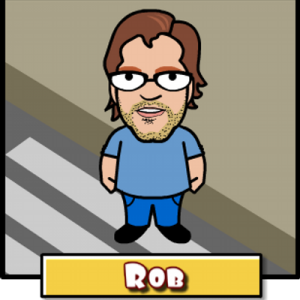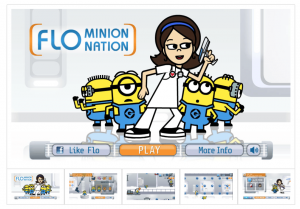Rob Grossberg is the co-founder and CEO of TreSensa, Inc., a NYC-based marketing platform for mobile that leverages branded “tap and play” HTML5 games to connect brands with their target audiences at scale on mobile. He also received a JD from NYU School of Law in '95. Read on to hear Rob's experiences as an entrepreneur and CEO of a startup.
Tell us about yourself and your area of expertise
My name is Robert Grossberg and I’m the CEO of TreSensa. TreSensa is a mobile creative technology 
company focusing on playable ads. It is an emerging, new form of mobile marketing where the ad is a game of highly engaging interactive experiences to coworking and assisting. We have offices n New York and San Francisco and a team of 20. As the CEO, my focus is largely on building the team, raising the funds to support the business, setting the strategic direction and tending to business development and strategic deals.
Did you join any incubator programs to grow TreSensa
In 2012, our first year, we were part of an accelerator called First Growth Venture Network. It is run by Lowenstein Sandler, which is a prominent law firm here in New York that does a lot of work with startups. They have a very well esteemed accelerator program. We were in a program with about 16 companies and the program lasted about 6 months.
How has the incubator program helped with TreSensa’s and your personal growth as an entrepreneur
 Well, I thought the incubator worked best for first time entrepreneurs like me. There were various sessions on raising seed funds, assessing product-solution fit, marketing of your company–all those areas which I wasn’t essentially involved with in my roles with other companies. The incubator program allowed me to sort of demystify a lot of the various pieces of the puzzle in running a startup. I think the biggest advantage to me and TreSensa was the networking opportunities that was available with the mentors, with companies that were in the program with us, and other companies from prior generations that you were able to meet and speak with and start building potential businesses.
Well, I thought the incubator worked best for first time entrepreneurs like me. There were various sessions on raising seed funds, assessing product-solution fit, marketing of your company–all those areas which I wasn’t essentially involved with in my roles with other companies. The incubator program allowed me to sort of demystify a lot of the various pieces of the puzzle in running a startup. I think the biggest advantage to me and TreSensa was the networking opportunities that was available with the mentors, with companies that were in the program with us, and other companies from prior generations that you were able to meet and speak with and start building potential businesses.
What was your experience in finding team members and building a company in general? Did the incubator help in finding team members for TreSensa?
Not really. I was 42 when I started a company 5 years ago, after having worked at a successful New York based company called DoubleClick. So I already had an existing network of people I managed. Sort of the early team, the core team. We built around folks we knew from various prior roles.
So what sparked your interest in starting TreSensa?
I am a lawyer by trade with a JD from New York University and I worked at big law firms for three years. Then I caught the startup vibe where I can see what it really feels like to work at growing companies in an emerging industry. I was sort of attracted to that entrepreneurial energy and opportunity. So I started there and I got to the business side about halfway through my time at DoubleClick to head up sales and operations and then became general manager of product at another advertising company before going to Tremor Video where I was head of operations.
Over the four years at Tremor, I had built a lot of experience in running the day to day business. That was when I asked myself the question, “Why not me? Why can’t I be the CEO?”. I went through those steps to build up the confidence and my expertise. Finally I had the opportunity and I went for it.
What were the biggest obstacles as a startup founder that you had to overcome in the process of starting TreSensa
The biggest obstacles were getting funding and honing in on that business idea. I was a first time CEO on my first ever startup, so early on we took on a very hard task at looking at HTML 5 and what it meant for mobile gameplay and mobile marketing. The focus was on building a long-term vision and we knew that was probably gonna take several years to unfold.
We were at a different time and we needed to raise money. Mobile marketing was growing exponentially but still underutilized by most brands. We had to tell our story and convince other people that this business strategy was gonna be viable. But really you don’t know if it’s gonna work or flop. So, for me, I thought that was a challenge, you have to put on your sales hat and tell your story, at the same time, you’re diving into this big ocean and really don’t know where it’s gonna take you.
Are there any competitors to TreSensa, and if there are, what sets TreSensa apart?
 What we’re doing now is playable ad technology. The way to describe it is you have a couple of existing big buckets of mobile marketing types of display, banner type advertisement on mobile. Another bucket is video, you see a lot of video ads out there. People think there’s a new bucket emerging and that is mobile rich VPN, mobile ads in which we replace the band and we feel the big opportunity lies in the playable ad space.
What we’re doing now is playable ad technology. The way to describe it is you have a couple of existing big buckets of mobile marketing types of display, banner type advertisement on mobile. Another bucket is video, you see a lot of video ads out there. People think there’s a new bucket emerging and that is mobile rich VPN, mobile ads in which we replace the band and we feel the big opportunity lies in the playable ad space.
There’s a few other companies dipping into and doing playable ads. Many have focused on streaming technology, so they basically put a version of the app in the cloud and allow the user to stream and play 30 seconds to 60 seconds of that app. Our approach is very different, in HTML 5 we’re re-creating an almost trailer-like version of the game, so we’ll take the best elements of the game and sort of weave them together in a cohesive 1 to 2 minute type of experience that the user could engage with. The other playable companies are sort of starting and playing a 30 second clip of a movie.
You have been a mentor at the Entrepreneurial Institute startup programs in the past. Could you tell us about the experience?
I’ve always enjoyed being a mentor at NYU especially over the last two Summer Launchpad programs. It was a fantastic experience and enjoyed working with the Institute team members. The quality and talent of startups were impressive. Once a week we would have a phone or in-person meeting with the startup team I was mentoring and I am happy to see the companies that I mentored still plodding forward.
Any advice for aspiring entrepreneurs, for first timers especially?
This is what I spoke about a year ago, my general business advice is don’t be an asshole. In business, I have learned from experience, you have to work hard and help people where you can as it comes back to help you. For example at DoubleClick when I’m working with young sales guys, I went out of my way to provide extra support and get the deals done. Many of these guys are out there running companies or are head of sales at Google or other big companies.
Now that I have a business, I’m looking to connect to the right people and do various business deals, invariably I’ve come across people I’ve worked with in the past. So if you give them a call or call in a favor and you had a good working relationship with them and treated everyone well, they’ll remember. That stuff comes back and they’ll want to help you.
That’s my advice–don’t be an asshole.
[All graphics in this blog post are proprietary to TreSensa].
About the author:
Shaun Chua is studying Mathematical Aesthetics at NYU Gallatin. He has a burning desire create and is in the process of developing his own iOS application. Shaun is also working on a social media venture with two other people.







